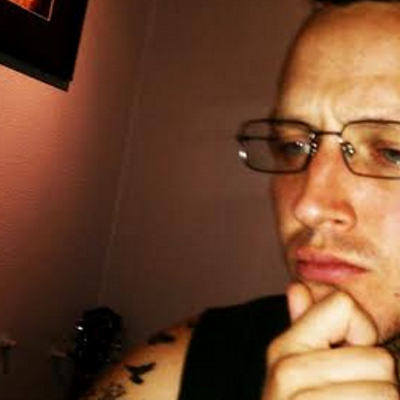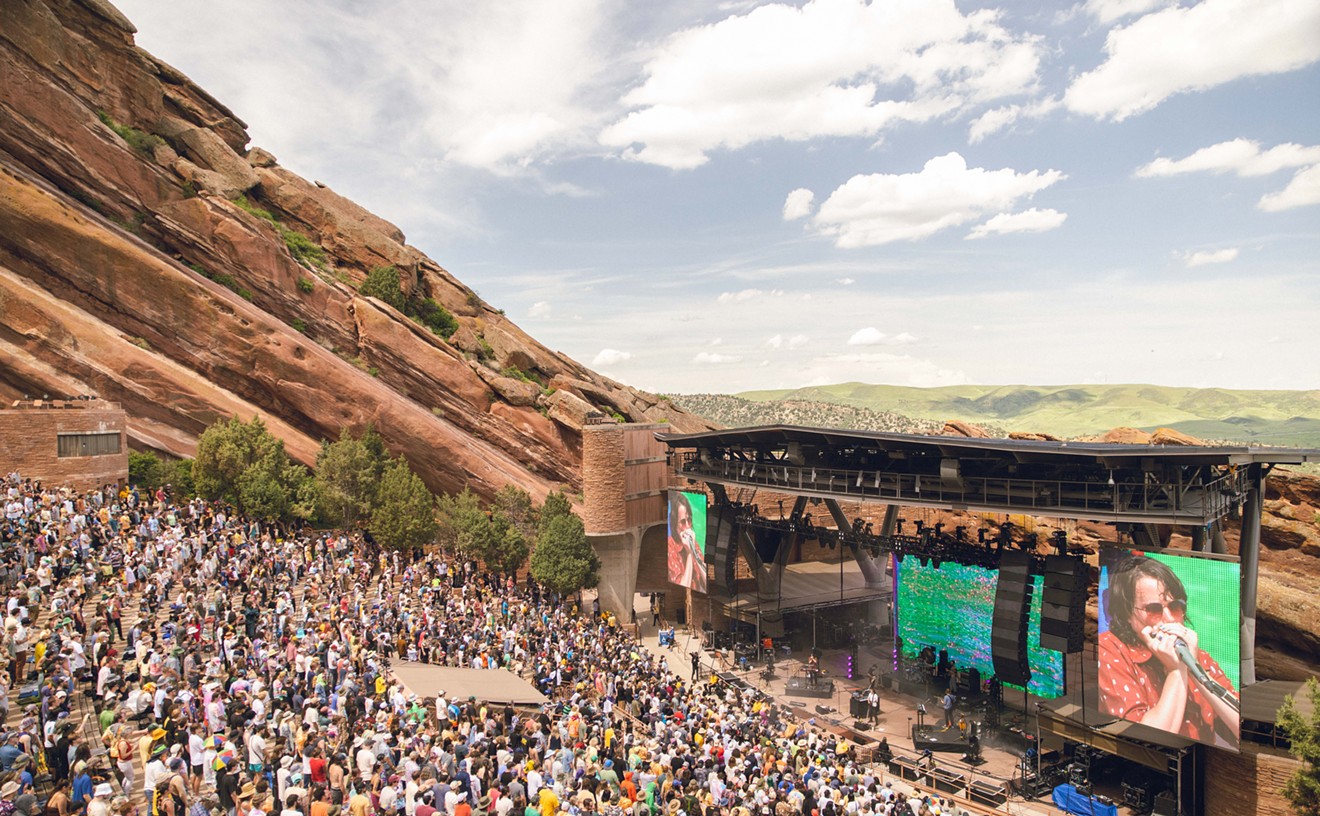It was a different Baker back when
Today, Baker — and the stretch of Broadway that runs through the center of it — is the lifeblood of Denver’s music scene, with local and touring bands performing on a nightly basis in the street’s numerous clubs.
Rateliff’s contributions and consistent presence in the neighborhood — through his work in Born in the Flood, the Wheel and a very successful solo project — have played a vital role in Baker’s transformation. He may not be able to afford today’s rising housing costs, but his influence on the area, and on Denver’s music scene as a whole, can’t be denied. In a 2009 interview with Westword, members of the Rouge cited
“Joseph [Pope] and I were playing in a band [in Missouri] that was the precursor to Born in the Flood, called 76 Drown,” he recalls. “I was playing lead guitar, and I didn’t want to be the singer. I was writing songs, but they were just cheesy love songs I played at parties.”
While Pope and
“Joseph and I moved to Denver just to follow a friend who was moving here,”
Pope and
“That was when everything shifted. I feel like the hi-dive changed everything,” he says. “We lived right here, and that was our scene; we played
With an established home base, Born in the Flood saw its audience grow and was soon one of Denver’s premier bands. Still, success didn’t come as easily outside of the city. “We tried to tour, and it was really hard,” Rateliff says. “I think every popular band in Denver has that problem. You can sell out the Gothic or the Bluebird, and then you drive to Kansas City, and it’s you, the other band, the sound
As the years went on and the band still struggled to find a national audience, Rateliff experimented with other music and began writing more somber, acoustic-based songs, eventually performing under the moniker the Wheel. He played with both acts for a time, but the Wheel was quickly becoming his priority, and his enthusiasm for Born in the Flood
“I had
During a 2008 trip to the CMJ festival in New York,
However, this meant turning down label offers for Born in the Flood that were in the works, including one from the traditionally heavy-metal-oriented Roadrunner Records. The decision to sign with Rounder was not a popular one with
“I knew that by signing to Rounder it would hurt the relationships of the people I was playing with,” Rateliff says. “But I didn’t want to be on the same label as Slipknot, and I just didn’t want to sing ‘Anthem’ anymore.”
Although
“We figured out that we’ve been playing together for 21 years,” says Rateliff. “We’re brothers. You gotta stick with your brothers.”
Rateliff also recruited upright bassist and vocalist Julie Davis, keyboardist James Han and drummer Ben Desoto, and what started as a vessel for
“We toured around for five years on that project,” Rateliff says. “It was hard. We were just slumming it with no tour support, but it was fun to be a family like we were.”
While Rateliff continued to travel the world and progress as a songwriter and performer, his ascent to success was a slow one. His follow-up record, 2013’s Falling Faster Than You Can Run, was passed on by Rounder. This stalled Rateliff’s momentum and left him feeling dejected and seeking a new direction yet again.
“I was feeling a little discouraged that the record wasn’t going to come out on [a label],” he says. “I was also doing some solo touring that caused some problems with the band.... Everybody was having to work other jobs because I couldn’t afford to bring anybody out. I was just over everything.”
It was at this musical low point that he was approached by a friend, Jeff Linsenmaier, who plays keyboard for the Fray, about recording some songs at his studio and then releasing them as a seven-inch single.
“He told me it could be anything I wanted and asked if I had anything new I wanted to try,” Rateliff says. “I told him I had always wanted to try some soul and R&B stuff.”
Without the pressure of a label bearing down on him, Rateliff embraced the freedom of relaxed expectations and went to work right away.
“I had just got a cool new guitar and wrote ‘Trying So Hard Not to Know’ that day,” he remembers. “I was so stoked that it actually worked! Later that night, I was lying in bed and was thinking it would be cool if that song segued into another song that had horns. I got up out of bed and recorded some ideas that became ‘Look It Here.’ I finished that song the next day, and then I wrote another one and another one, and soon I had an album’s worth of songs.”
Excited with the new material he had constructed, which was meant to sound like a more soulful version of the Band, Rateliff recruited some seasoned Denver musicians, including saxophonist Andy Wild of A. Tom Collins, keyboardist Mark Shusterman of the Blue Rider, guitarist Luke Mossman and trumpet player Wesley Watkins, while also re-enlisting Meese and Pope, and Nathaniel Rateliff & the Night Sweats were born.
The group played its first show in 2013 at the Bluebird Theater, and from the very beginning, it was clear that Rateliff had created something special. The crowd that night was in a frenzy, the songs exploded from the stage, and the once-discouraged Rateliff was fronting a new band that was full of life, energy and soul.
From there, momentum started to build, and opportunities that once seemed to pass Rateliff by started coming his way. He brought a tireless work ethic to his new project, playing constantly, traveling, and honing the band’s sound. While the formula was familiar, the inspiration was back: In a way, Rateliff had been reborn.
Eventually, a label that was going through a revival of its own came courting. Stax Records, the legendary soul label once home to pioneers like Johnnie Taylor, Booker T. & the M.G.s and Otis Redding, had shut its doors in 1976 after an “unsuccessful distribution deal” led to bankruptcy. But a deal with Fantasy Records in 2003 and the opening of the Stax Museum of American Soul Music in Memphis brought the company out of the shadows and back to work with contemporary artists who matched the spirit of its original output. Wanting to carry on the great American soul-music tradition it had helped establish decades prior, the label sought out Rateliff and struck a deal with the Night Sweats to release their debut, aiding both the artist’s and the label’s rise from the ashes.
Produced by Richard Swift, who has played with the Black Keys and the Shins and produced records by Damien Jurado and the Mynabirds, the Night Sweats’ self-titled debut swells and shifts across the musical spectrum. From the rousing opener, “I Never Get Old,” to the introspective “Wasting Time,” the album takes listeners down many roads. Still, at their core, the songs encapsulate Rateliff’s unique spirit and make it apparent that this project might be the one that he was searching for all along.
And while new resources and a heavy touring schedule will put him in front of thousands of new fans, Rateliff knows that his current situation is the product of years of hard work.
“Things are looking good, and we have a bunch of amazing people behind us putting in time and money,” he says. “We have to honor that by doing the same thing and working hard, like we always have.”
“Joseph and I always wanted to be full-time musicians, but I never thought I’d continue to work for so long,” he continues. “I hope that Joseph, myself and Patrick [Meese] encourage people to do what they love. You have to sacrifice a lot of things, but if you continue to do the things you love, sometime it can work out. This community has been really kind to Joseph and I.”
On August 5, Nathaniel Rateliff & the Night Sweats made their national-television debut on The Tonight Show Starring Jimmy Fallon. The performance was a resounding success, with Fallon gushing about the group throughout the show. After their performance of the song “S.O.B.,” the studio audience gave them a standing ovation.
At the hi-dive, the club that started it all for Rateliff, people from all segments of the Denver music community gathered to watch the show. Old bandmates like Julie Davis and collaborators like Joe Sampson beamed as Rateliff and company took full advantage of the opportunity. While Rateliff was thousands of miles away, his loyal friends and fans in Denver treated the performance as if they were right there alongside him — just as they always have been.
Nathaniel Rateliff & the Night Sweats In-store performance, 6 p.m. Thursday, August 20, Twist & Shout, free, 303-722-1943.











